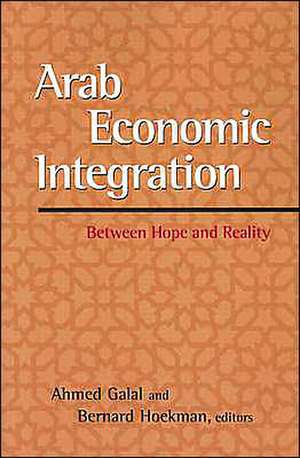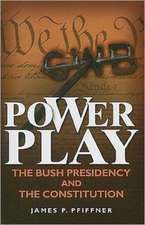Arab Economic Integration: Between Hope and Reality
Editat de Ahmed Galal, Bernard M. Hoekmanen Limba Engleză Paperback – 15 mai 2003
Improving the economic performance of Arab countries is now more critical than ever. The region faces high population growth rates, rising unemployment, and modest economic growth coupled with increasingly intense competition from emerging markets in eastern Europe, Latin America, and Asia. Meeting these challenges requires finding ways to overcome political obstacles that impede socially beneficial economic reforms. Despite fifty years of repeated attempts at Arab economic integration, the results in terms of intraregional trade and investment flows have been very modest. This book explains why and discusses possible ways forward. The authors draw especially on the success of the European Union to assess the scope of Arab economic integration as an instrument for narrowing the persistent gap between the region¡¯s economic potential and its performance.
Preț: 210.00 lei
Nou
Puncte Express: 315
Preț estimativ în valută:
40.18€ • 42.07$ • 33.25£
40.18€ • 42.07$ • 33.25£
Carte tipărită la comandă
Livrare economică 05-19 aprilie
Preluare comenzi: 021 569.72.76
Specificații
ISBN-13: 9780815730316
ISBN-10: 0815730314
Pagini: 170
Dimensiuni: 152 x 229 x 13 mm
Greutate: 0.25 kg
Ediția:New.
Editura: Brookings Institution Press
Colecția Brookings Institution Press
Locul publicării:United States
ISBN-10: 0815730314
Pagini: 170
Dimensiuni: 152 x 229 x 13 mm
Greutate: 0.25 kg
Ediția:New.
Editura: Brookings Institution Press
Colecția Brookings Institution Press
Locul publicării:United States
Notă biografică
Ahmed Galal is Private Sector Development Adviser at the World Bank and a member of the Board of the Egyptian Center for Economic Studies. Bernard Hoekman is research manager, International Trade, in the World Bank's Development Research Group. He is also a research fellow of the Centre for Economic Policy Research, London.
Descriere
A Brookings Institution Press and the Egyptian Center for Economic Studies (ECES) publication
Improving the economic performance of Arab countries is now more critical than ever. The region faces high population growth rates, rising unemployment, and modest economic growth coupled with increasingly intense competition from emerging markets in eastern Europe, Latin America, and Asia. Meeting these challenges requires finding ways to overcome political obstacles that impede socially beneficial economic reforms. Despite fifty years of repeated attempts at Arab economic integration, the results in terms of intraregional trade and investment flows have been very modest. This book explains why and discusses possible ways forward. The authors draw especially on the success of the European Union to assess the scope of Arab economic integration as an instrument for narrowing the persistent gap between the region¡¯s economic potential and its performance.
Improving the economic performance of Arab countries is now more critical than ever. The region faces high population growth rates, rising unemployment, and modest economic growth coupled with increasingly intense competition from emerging markets in eastern Europe, Latin America, and Asia. Meeting these challenges requires finding ways to overcome political obstacles that impede socially beneficial economic reforms. Despite fifty years of repeated attempts at Arab economic integration, the results in terms of intraregional trade and investment flows have been very modest. This book explains why and discusses possible ways forward. The authors draw especially on the success of the European Union to assess the scope of Arab economic integration as an instrument for narrowing the persistent gap between the region¡¯s economic potential and its performance.







